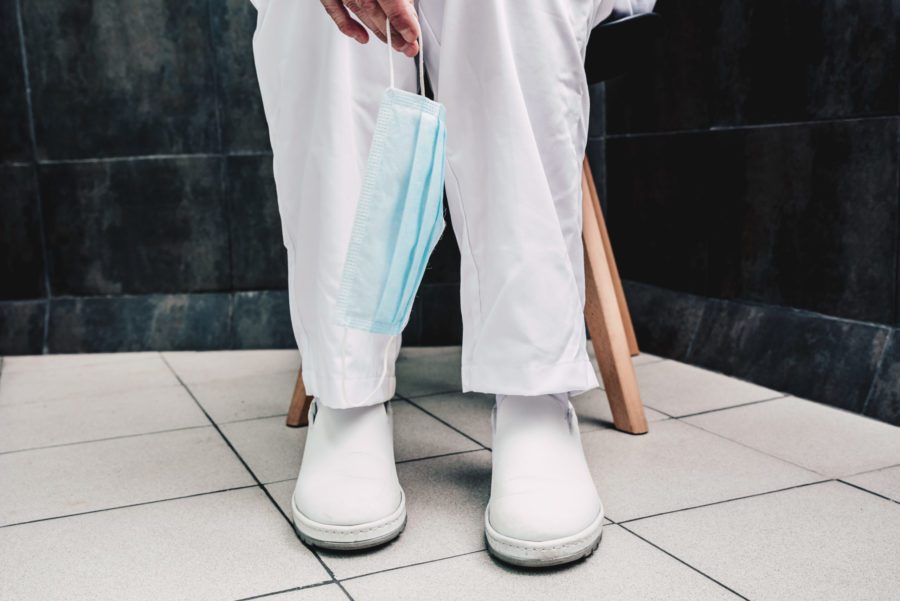As a nurse, you spend long days hustling between the patients in your care. That means constant walking, standing, and even physically lifting patients—whatever it takes. Even after hours on your feet and on the go, you muster the energy to make sure your patients are well-cared-for and comfortable.
One thing that can make you more comfortable on a marathon shift? The right pair of shoes.
That’s why Host Healthcare has teamed up with Vionic to give away 24 pairs of ultra-supportive shoes.
We appreciate the work of frontline healthcare workers, and we want you to step into spring in style and comfort. Below, we’ll explain the importance of the right footwear and the details of our giveaway with Vionic.
The Link Between Nursing and Foot Pain
Most nurses walk 9,000 steps per shift. That’s close to four miles! We probably don’t need to explain that a high step count plus hours of standing can take a toll on your feet. We’re betting you’ve felt the soreness firsthand.
Over time, most nurses get used to spending long hours upright. But it’s worth reviewing the more serious effects that nurses experience without the proper footwear and foot care.
These include:
- Corns and calluses – While developing hard, raised areas on your feet isn’t necessarily dangerous, it can be quite uncomfortable. It’s hard to grant your patients full attention when you’re struggling to keep your mind off your aching feet.
- Digital deformities – From bunions to hammertoes and beyond, the wrong shoes can push your toes too close together, changing the shape of the digits over time. This crowding can cause discomfort in and of itself. Besides that, a lack of adequate, flexible support from your base (your feet) can lead to back pain and other symptoms over time.
- Varicose veins – Increased blood pressure in your legs can twist and deform your veins. In some cases, these visible veins may make you self-conscious. In others, they lead to leg cramps and swelling.
- Foot pain – Beyond the specific conditions we’ve discussed above, nurses can develop heel pain, plantar fasciitis, and heel spurs as a result of the long hours they spend on their feet.
How to Maintain Foot Health
Foot health is important for everyone, but it’s especially key for healthcare professionals who spend significant time on their feet.
To keep your feet cozy and well-protected from workplace hazards, take the following steps.
#1 Find Supportive, Workplace-Appropriate Shoes that Fit
As a nurse, your workplace is likely subject to OSHA regulations requiring footwear that protects the feet from blood, chemicals, and the risk of compression.
Check your workplace standards and make sure your footwear is OSHA-compliant. But be aware that just because a shoe is approved doesn’t mean it fits all the requirements for healthy feet.
When selecting the shoes you’ll wear to work, look for features like the following:
- Breathability – When your feet get sweaty, you’re more likely to develop fungal infections and blisters. Some nurses wear rubber shoes. But mesh, nylon, and other breathable materials can better circulate air. In addition, they’re lightweight, which can make it that much less tiring to walk around all day.
- Heel counter – Clogs are popular with nurses. Unfortunately, though, the lack of pressure on the heel means less support for the arch and overall foot. Over time, this can lead to heel pain, collapsed arches, and other issues. Instead of a clog, look for a shoe that covers your foot from toe to heel.
- Arch support – How do you know if your shoe is adequately supporting your arch? Try removing the insole and manually compressing it with your hand. If it doesn’t give, it’ll likely stand up to your body weight and support your arch.
Beyond these factors, make sure the shoe fits comfortably, with some wiggle room for your toes.
#2 Stretch Your Feet
Stretching your feet during your breaks or at the end of your workday can increase blood flow and help unwind any tension that’s accumulated.
Your stretching routine doesn’t have to be complicated. Try out simple tricks like the following:
- Ankle rolls – Remove your shoes and slowly rotate your foot from your ankle 15 or so times. Then, reverse the direction. Do both feet at once or concentrate on one at a time—it’s up to you!
- Stretch the bottom of your foot – Standing up, step your right foot behind your left. Put your weight into your right toes, raising your heel off the ground into a “Barbie foot.” Hold for 20-30 seconds. Then, repeat on the other side.
- Don’t forget your calves – The fascia on your feet extends up your calves, attaching at the knee. Therefore, stretching your calves can improve your overall foot health. Stretch your calves at the wall (by placing your toes on the wall and your heel on the floor).
- Use props – Massage the bottom of your foot with a lacrosse ball or specialized foot massage tool. You can perform your self-massage standing or sitting.
Taking just a few minutes per day to stretch your feet can have a noticeable effect.
Of course, a more in-depth session at the yoga studio can also help. Likewise, the occasional professional foot massage goes a long way toward happier hooves.
#3 Try Accessories
Sometimes, upgrading to a new pair of shoes isn’t in your budget. If that’s the case, try hacking your current shoes. Try out:
- Compression socks – Densely woven compression socks squeeze the skin, muscles, and vascular tissue, helping to promote circulation. This can combat varicose veins and other vascular problems.
- Inserts – The best shoes for nurses won’t require inserts. But if you’re not ready for a new pair just yet, invest in inserts that provide extra support where you most need it (heel, arch, toes, or whole-foot).
#4 Don’t Forget Your Toenails
The last thing you need is an ingrown toenail.
Be sure to trim your toenails regularly. If it’s in your budget, treat yourself to the occasional pedicure. The pumice stone and foot massage can make a difference in your foot health and help you relax.
#5 When All Else Fails, Seek Expert Help
As a nurse, you’ve seen dozens of patients who held out for years on getting professional help. While their problem may not have reached a crisis, it likely eroded their quality of life. And without action, some problems get worse over time.
If you’re concerned about your foot health, see a podiatrist. In addition, shop for footwear recommended by the American Podiatric Medical Association.
Vionic Shoes For Nurses
A good nursing shoe can be hard to find.
When we discovered Vionic, we knew right away their technology-backed shoes were the perfect item for nurse giveaways.
- Vionic was founded in 1979 by podiatrist Phillip Vasyli. Realizing it was costly and time-intensive to reverse most common foot issues, he began designing a line of non-prescription orthotic shoes.
- Vionic shoes are designed to provide support in key three zones—the toe, the arch, and the heel—helping stabilize the overall foot.
- Many shoes carry The American Podiatric Medical Association stamp of acceptance.
When you think of an “orthotic shoe,” it’s easy to imagine something less than fashion-forward. But Vionic’s Wear to Work line features a wide array of nursing-friendly shoes in styles that range from trendy to downright elegant.
With sandals, boots, and beyond, Vionic has the perfect shoes for nurses on the job or on the go. Treat your feet to support wherever you’re headed.
Take Your Career on the Road With Host Healthcare
Where do your nursing shoes take you?
With nursing skills in demand around the nation, your credentials can open the door to a life filled with travel and adventure.
At Host Healthcare, we’re one of the leading travel healthcare companies. We help match nurses with high-paying, rewarding opportunities in the places they’d most like to visit, live, and work. Apply with us to become a travel nurse and get matched with the jobs that best meet your skills and lifestyle.
With your Vionic shoes, you’ll be able to travel and work in comfort—wherever the journey takes you.
Sources:
Harvard Health. Exercises for healthy feet. https://www.health.harvard.edu/healthbeat/exercises-for-healthy-feet
AmeriTech College of Health Care. Nurse’s foot health. https://www.ameritech.edu/blog/nurses-foot-health/
Cleveland Clinic. Nursing self-care. https://consultqd.clevelandclinic.org/nursing-self-care-keep-feet-feeling-their-best-before-during-and-after-shifts/










